The recent rise in tensions between Iran and the West, following Israel’s assault on Tehran’s nuclear facilities, has reignited concerns about a potential blockade of the Strait of Hormuz. This narrow passage is crucial for international energy trade, with over 20% of the world’s oil transiting daily.
If Iran were to shut down the Strait, the immediate effect would likely be a spike in oil prices. Analysts predict that prices could soar above $150 per barrel, leading to widespread inflation. Rising fuel costs would disrupt supply chains and transportation, directly affecting living standards, particularly in emerging economies that are more susceptible to such disruptions.
The military implications of a blockade are particularly alarming. The United States, which has a significant presence in the region, has made it clear that it would not tolerate any closure of this passage. Any Iranian actions might provoke a direct military response, potentially involving attacks on naval forces and key Iranian facilities. Further complicating matters, the participation of regional adversaries like Saudi Arabia and the UAE could escalate tensions into a significant conflict in the Gulf.
While some Gulf nations, like Saudi Arabia and the UAE, have established pipelines that bypass the Strait, these alternative routes cannot accommodate all of the region’s oil exports. In contrast, countries such as Kuwait, Qatar, and Bahrain remain entirely reliant on the Strait of Hormuz.

If tensions escalate, the U.S. and the European Union may need to tap into their strategic reserves to mitigate market shocks. Additionally, nations like China and India, which rely heavily on oil imports via the Strait, might feel compelled to play a more active role in diplomatic efforts to resolve the crisis.
Iran’s threats to close the Strait of Hormuz are not new; however, the current global context—marked by Europe’s energy crisis, the ongoing war in Ukraine, and a fragile economic recovery—heightens the risk involved.
The pressing question is whether Tehran will employ this threat as leverage for negotiation or if it will provoke an unprecedented global crisis.
Despite dire predictions from analysts at organizations like Reuters and AFP, oil market experts speaking to CNBC suggest that a complete disruption of global oil flows through the Strait is not only unlikely but also possibly unfeasible.
“There’s no clear benefit to blocking oil transit through the Strait of Hormuz, particularly since Iran’s oil infrastructure hasn’t been directly affected,” stated Ellen Wald, president of Transversal Consulting. She cautioned that such an action would likely invite retaliation. A significant increase in oil prices from a blockade would also trigger backlash from Iran’s largest oil customer, China.
“Beijing does not want any disruption to oil flows from the Persian Gulf and will leverage its economic influence on Iran,” Wald noted. China is the dominant importer of Iranian oil, accounting for over three-quarters of Tehran’s exports, and is also Iran’s largest trading partner.
“In this scenario, their friends would suffer more than their foes… Thus, it’s difficult to envision such a situation,” added Anas Alhajji, CEO of Energy Outlook Advisors. He pointed out that closing the Strait would likely be more catastrophic than beneficial for Tehran, as a significant portion of Iran’s daily consumer goods also relies on this route.
Ask me anything
Explore related questions

















